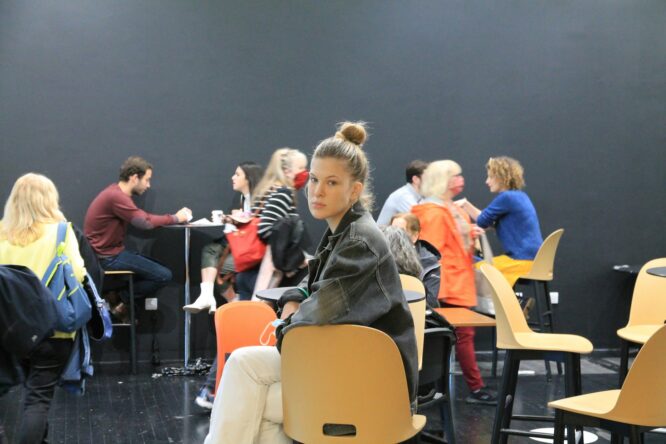People with autism may process and behave a bit differently from non-neurodivergent people, but that doesn’t mean you should speak to them any differently.

There are certain things autistic people hear far too often, and while these things might be well-intentioned, they often come off as condescending, inappropriate, and a bit clueless, to be honest. If you know someone who’s on the spectrum, think twice before saying any of these things in the future. It’ll be appreciated!
1. “You don’t look autistic.”

Autism doesn’t come with a specific “look.” It’s not like wearing a badge or having a special haircut. Telling someone they don’t “look autistic” can come off as dismissive. Instead, try asking them about their experiences and how you can support them better.
2. “Everyone’s a little autistic.”

While everyone can relate to certain traits, autism is a unique way of experiencing the world. Saying this diminishes what autistic people go through. Instead, acknowledge that their experience is valid and might be different from yours.
3. “You’re just overreacting.”

For someone who is autistic, sensory overload or intense feelings are very real. Dismissing it as an “overreaction” doesn’t help. Instead, try asking how you can make things more comfortable for them. A little understanding goes a long way.
4. “But you’re so smart!”

Being autistic and being smart aren’t mutually exclusive. This phrase implies surprise that someone can be both. Instead, celebrate their abilities without framing it as an exception. Everyone’s strengths deserve to be recognised.
5. “You should try to be more social.”

Socialising might be draining or challenging for someone who is autistic. Pushing them to be more social can feel invalidating. Instead, respect their social boundaries and appreciate them for who they are, not who you think they should be.
6. “It’s just a phase.”

Autism isn’t something someone grows out of. It’s a lifelong part of who they are. Suggesting it’s temporary can make them feel misunderstood. Instead, accept that their experiences are genuine and ongoing.
7. “You’re too sensitive.”
 Source: Unsplash
Source: Unsplash Many autistic people have heightened sensory awareness, and calling them “too sensitive” ignores this. Instead, be considerate of their sensory needs. If something’s bothering them, it’s valid, even if it doesn’t affect you the same way.
8. “Why can’t you just relax?”
 Source: Unsplash
Source: Unsplash Relaxing isn’t always easy when the world feels overwhelming or unpredictable. This phrase can come off as dismissive. Instead, ask if there’s something you can do to help create a calmer environment for them.
9. “Are you sure you’re autistic?”
 Source: Unsplash
Source: Unsplash Questioning someone’s diagnosis can feel invalidating. Autism presents differently in different people, and no one needs to prove their identity. Instead, trust their self-knowledge and focus on understanding their perspective.
10. “You must be really good at maths.”
 Source: Unsplash
Source: Unsplash Not every autistic person is a maths whiz, and assuming so is a stereotype. People have different strengths and interests. Instead, ask them what they enjoy or what they’re passionate about—it might surprise you!
11. “I’d never have guessed.”
 Source: Unsplash
Source: Unsplash This phrase can feel like a backhanded compliment. Autism isn’t something to hide or mask, and saying this might make someone feel they need to suppress who they are. Instead, focus on appreciating them for being themselves.
12. “Can you make eye contact, please?”
 Source: Unsplash
Source: Unsplash Eye contact can be uncomfortable or even painful for some autistic people. Forcing it doesn’t help. Instead, understand that communication doesn’t have to involve eye contact. They’re still listening, even if they’re not looking at you.
13. “You seem normal to me.”
 Source: Unsplash
Source: Unsplash “Normal” is subjective, and this phrase can make someone feel like their experiences are being dismissed. Instead, try accepting their unique way of being without comparing them to a standard of “normal.” Everyone’s different, and that’s a good thing.
14. “Stop being so rigid.”
 Source: Unsplash
Source: Unsplash Routine and structure can be crucial for someone who is autistic. Telling them to “loosen up” can feel dismissive of what helps them feel safe and secure. Instead, try to understand why routine matters and support their need for structure.
15. “You’re so lucky you don’t have to deal with [insert issue].”
 Source: Unsplash
Source: Unsplash This phrase diminishes the challenges they *do* face. Everyone has struggles, even if they’re not obvious. Instead, focus on empathy and understanding their experience rather than comparing difficulties.
16. “I know someone who’s *really* autistic.”
 Source: Unsplash
Source: Unsplash Autism isn’t a competition, and saying this can make someone feel like their challenges don’t matter. Everyone’s experience with autism is valid, whether it’s visible or not. Instead, listen and learn about their unique perspective.




